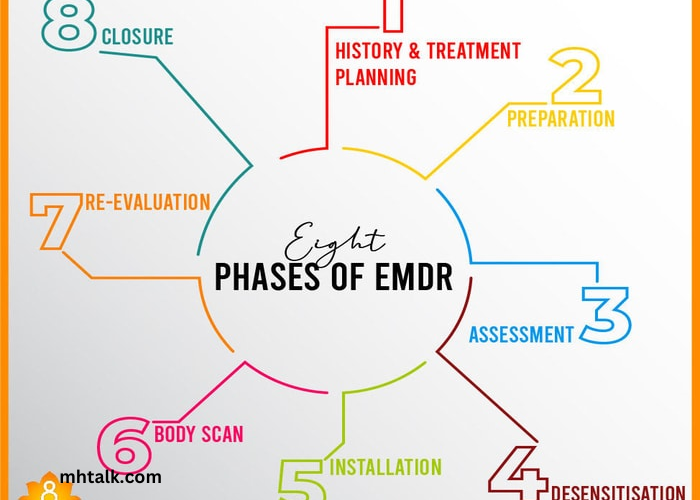Have you ever wondered if there’s a more effective way to address the deep-seated roots of depression? Enter Eye Movement Desensitization and Reprocessing (EMDR), a therapy that’s redefining the treatment landscape for depression and mental health. This blog post aims to unravel the intricacies of EMDR, shedding light on its procedures and effectiveness, particularly in tackling emdr depression.
What is EMDR?
EMDR is a psychotherapy treatment designed to alleviate the distress associated with traumatic memories. Developed in the late 1980s by Francine Shapiro, EMDR therapy is based on the premise that psychological distress is often due to disturbing life experiences that have not been adequately processed.
The Underlying Theory
EMDR therapy posits that the mind can heal from psychological trauma much as the body recovers from physical trauma. When you cut your hand, your body works to close the wound. If a foreign object or repeated injury irritates the wound, it festers and causes pain. Once the block is removed, healing resumes. EMDR therapy demonstrates that a similar sequence of events occurs with mental processes.
The EMDR Procedure
EMDR therapy involves eight phases, focusing on memories, present disturbances, and future actions needed for adequate processing.
Phases of EMDR Therapy
History and Treatment Planning: The therapist assesses the client’s history and decides where to start the EMDR processing.
Preparation: The therapist ensures the client has several different ways of handling emotional distress and educates them about the EMDR process.
Assessment: The therapist identifies the vivid visual image related to the memory, a negative belief about oneself, related emotions, and body sensations.
Desensitization: This involves the use of EMDR therapy techniques to alleviate the distress associated with the disturbing memory.
Installation: The goal here is to strengthen the positive belief that the client wants to have.
Body Scan: The therapist asks the client to observe their body’s response and works to alleviate any residual tension.
Closure: This ensures the client leaves at the end of a session feeling better than at the beginning.
Reevaluation: At the beginning of the next session, the therapist checks on the client’s psychological state.
The Role of Bilateral Stimulation
A key component of EMDR therapy is bilateral stimulation, usually through side-to-side eye movements. This bilateral stimulation is believed to be linked to the biological mechanisms involved in Rapid Eye Movement (REM) sleep, which can help process traumatic memories and disturbing emotions.
Effectiveness of EMDR for Depression
Clinical Evidence
Several studies have shown that EMDR can be effective in treating symptoms of depression. This effectiveness is attributed to the processing of traumatic and distressing memories that may be at the root of the depressive disorder.
Advantages Over Traditional Therapies
EMDR does not require talking in detail about the distressing issue or completing homework between sessions. It differs from traditional forms of cognitive-behavioral therapy because it focuses on emotions and physical sensations experienced in the present moment rather than solely on cognitive strategies.
Limitations and Considerations
While EMDR has been found effective for many individuals, it’s not a one-size-fits-all solution. The effectiveness can vary depending on the individual’s circumstances and the severity and complexity of their depression.
Northwest EMDR Therapy’s Approach to Depression
At Northwest EMDR Therapy, the focus is on adapting to each patient’s needs, offering EMDR as a critical technique for processing traumatic experiences contributing to depression. Their approach is personalized, ensuring that the therapy aligns with the individual’s journey towards healing and empowerment.
Why Choose Northwest EMDR Therapy
Northwest EMDR Therapy offers a nurturing environment where individuals can safely process painful memories. With a team of highly trained therapists, they provide a supportive space, fostering a journey towards healing and self-compassion. Their therapy is well-suited for long-term and short-term treatment, addressing not just symptoms but also the root causes of depression.
Conclusion
EMDR therapy presents a promising approach for those struggling with depression, particularly where trauma is a contributing factor. By enabling individuals to process and integrate traumatic experiences, EMDR can lead to significant improvements in mental health. However, it’s essential to approach this therapy with realistic expectations and under the guidance of a qualified therapist. As with any mental health treatment, individual experiences and outcomes may vary.
For those seeking EMDR therapy, Northwest EMDR Therapy provides a comprehensive, compassionate approach. Their tailored treatments and skilled therapists ensure that each individual embarks on a personalized journey toward recovery and resilience. Reach out to Northwest EMDR Therapy to begin your path to healing and discover your true potential.
Related posts
Recent Posts
InformalNewz: A New Era of Unconventional News Reporting
In the ever-evolving landscape of media and journalism, new platforms and approaches are constantly emerging to meet the demands of…
Balanced Living: Strategies for Achieving Wellness in a Hectic World
In today’s fast-paced world, achieving a sense of balance can often feel like an elusive goal. Juggling work, family, social…



